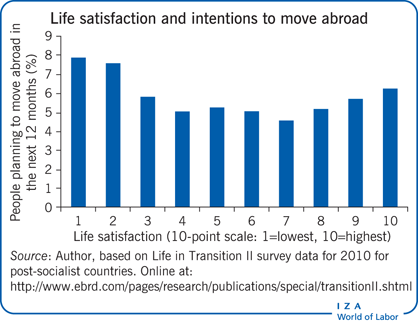Elevator pitch
Happy people are healthier and more creative, productive, and sociable. Because of these positive effects of happiness, it is in the interest of countries to attract and retain happy people. With respect to the decision to migrate, the central question becomes whether people who are happier and more satisfied with their lives are more or less likely to migrate. The evidence so far is mixed. Correlational studies find that prospective migrants are less happy than people who are not intending to migrate, while one study controlling for reverse causality suggests that the desire to migrate increases with life satisfaction.

Key findings
Pros
Higher levels of happiness are associated with better health, higher productivity, and enhanced social skills.
In migrant-receiving countries, happy immigrants may rely less on public health services, have better employment prospects, and integrate quicker into society.
Happiness is an important determinant of emigration decisions.
One study suggests a positive causal effect of life satisfaction on the intention to migrate.
Cons
People expressing a desire to migrate tend to be less happy.
The literature on happiness and the emigration decision is in its infancy, with most studies providing correlational rather than causal evidence.
People’s level of happiness can fall while they prepare to migrate.
Migrants’ experience in the receiving country can also erode their happiness.
A major data collection effort tracing migrant happiness before and after migration is necessary to determine causality.